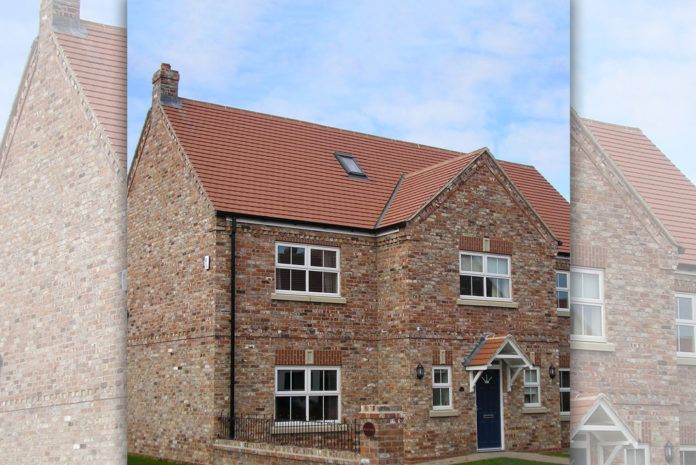
As the roofing industry continues to experience a significant uplift in workload throughout both the residential and commercial sectors, Chris Piper, sales director for housing developers at Ibstock PLC, discusses why roofing contractors should choose interlocking concrete tiles to increase on-site efficiencies and overall build quality.
The release of the National Federation of Roofing Contractor’s (NFRC) ‘State of the UK Roofing Industry Q1 2021’ report earlier this year identified that the roofing and cladding industry continued to perform well throughout the first quarter of 2021.
Over half of the 200 respondents surveyed reported a rise in workload when compared to the previous quarter, with all areas of the industry growing in the first three months of the year.
Notably, the domestic repair, maintenance and improvement sector experienced significant growth, as homeowners continued to utilise their disposable income for home improvement projects throughout the third lockdown.
However, roofing contractors also experienced labour issues throughout the first quarter of the year, with over half of those interviewed admitting they were struggling to find professionals to help fill the necessary roles required to meet the increase in demand. Most of these roles were required for roofing work within the residential market.
As the report concluded, roofing contractors expected the strong workloads experienced throughout Q1 to continue for the remainder of 2021. Professionals are under pressure to successfully meet this new level of demand, without having to significantly bolster their labour.
Innovative solutions
To achieve this, contractors are requiring innovative roofing solutions that proactively assist them in achieving a greater rate of building, without compromising on overall quality, sustainability or visual appeal.
As a durable and lightweight alternative to natural clay plain tiles, interlocking concrete roof tiles provide an effective and affordable option to support professionals in achieving these aims, as they significantly increase the overall speed of installation, without requiring additional labour or resources.
As the tiles are interlocking, only a single lap is necessary to ensure weather tightness. This substantially reduces the quantity of tiles required, whilst also effectively minimising the number of timber roof battens and roof trusses that must be fitted. The result is an installation that is a third quicker to fit and offers cost savings of up to a third, when compared to plain concrete roof tiles. This enables contractors to complete residential projects at a faster rate, without compromising the water tightness or longevity of the roof.
Durable, long lasting and minimises waste
Equalling the same size as two standard plain tiles, Forticrete’s Gemini concrete roof tiles are double cambered to achieve the aesthetic appearance of a traditional plain tile, with just 16.3 tiles required per square metre, compared to 60 standard plain tiles.
Constructed using Lafarge Cement’s SustainaCem, Gemini concrete roof tiles also feature substantially reduced embodied carbon, providing professionals with a more durable and environmentally friendly tile that delivers improved longevity and minimises product waste.
As interlocking concrete tiles can be laid to pitches as low as 22.5°, whilst standard plain tiles can only be laid to pitches as low as 35°, contractors can achieve a faster rate of building across a diverse range of renovation and refurbishment projects.
Taking this one step further, additional interlocking concrete roof tiles, such as Forticrete’s Centurion range, can be laid on pitches as low as 10°, making it the ideal material for single storey extensions or the construction of porches and canopies. As the tiles are also interlocked, they further increase on-site efficiencies, even when working to such a low pitch.
As both types of roof tiles are manufactured using the same high-quality ingredients, a unified aesthetic can be achieved across the entire roof. Here, roofing contractors can choose from popular traditional plain tile colours, such as mixed russet, slate or red, to effectively replicate the visual appeal of plain tiles, whilst significantly reducing the number of tiles required.
Traditional sandfaced tiles also feature subtle colour blends using red or grey palettes to reflect the aesthetic of older properties, making them the ideal choice for rural environments.
Roofing contractors should also work with manufacturers that offer a complete and complementary range of roof tiles and accessories, including dry fix fittings and ventilation systems. This not only effectively minimises lead times, but also ensures a perfect fit, as each element has been manufactured to be directly installed with one another. Because the materials are supplied by the same manufacturer, roofing contractors can also be confident the entire installation is backed by a comprehensive warranty, to provide both themselves and their customers with complete peace of mind
As the residential market is expected to remain a strong growth area for the industry throughout the remainder of 2021, roofing contractors can take a proactive approach to meeting these increased levels of demand, whilst simultaneously achieving the highest quality installation possible, by choosing interlocking concrete tiles and complementary roofing accessories.



